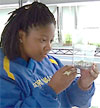The Pear Revival Journey
Karen AdamsSoon after arriving at WSU in 2006, I embarked on a journey with a passionate set of individuals to revive an industry that has remained in suspended animation since the early 1900s. An email from a pear farmer in Yakima urged me to apply for funding to do pear research. That was my first introduction to a segment of the Pacific Northwest fruit industry that, while long an underdog relative to apples, has long sought to reinvent itself for the 21st century marketplace. » More …

